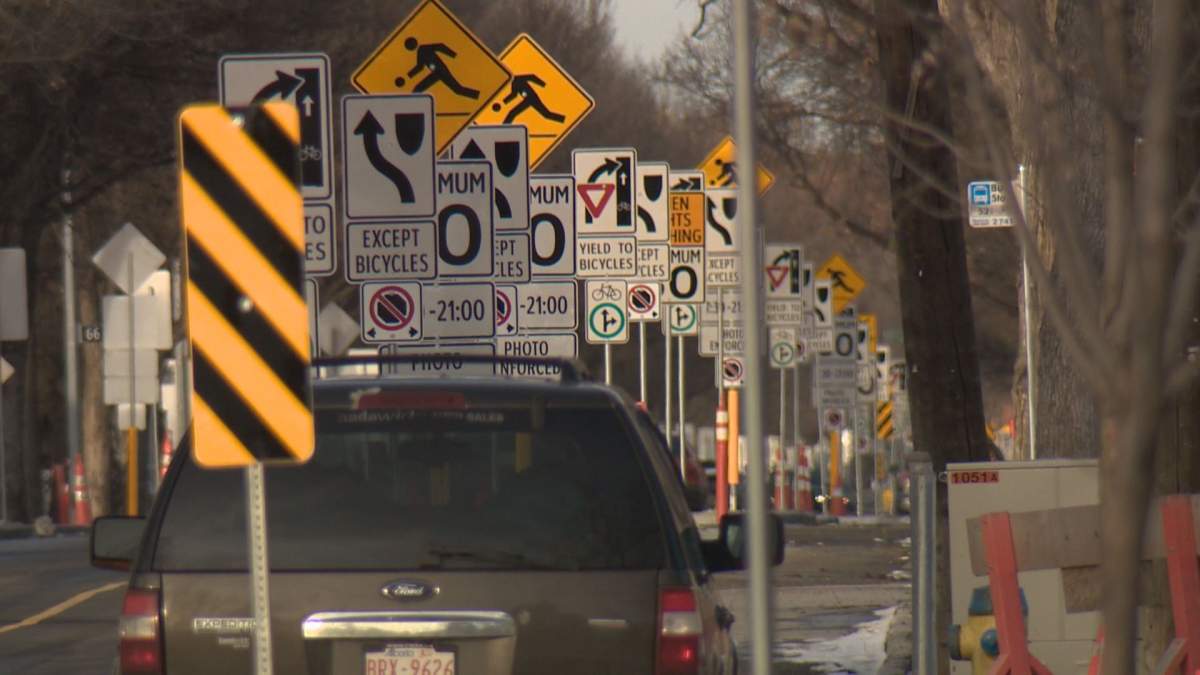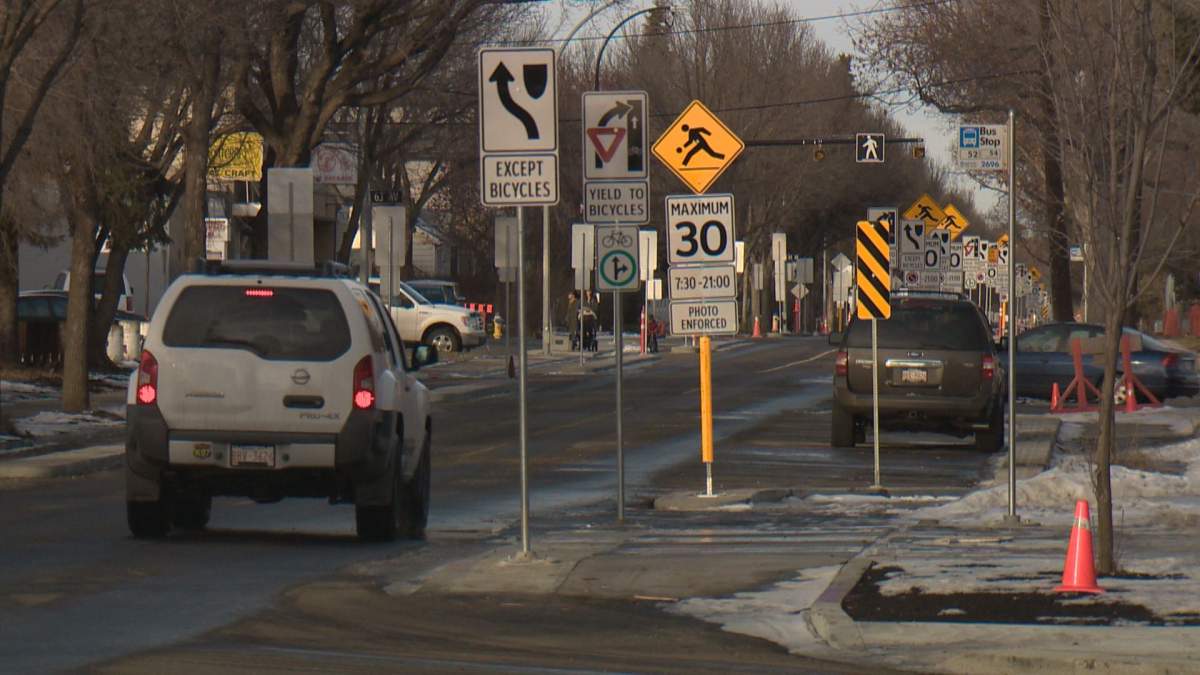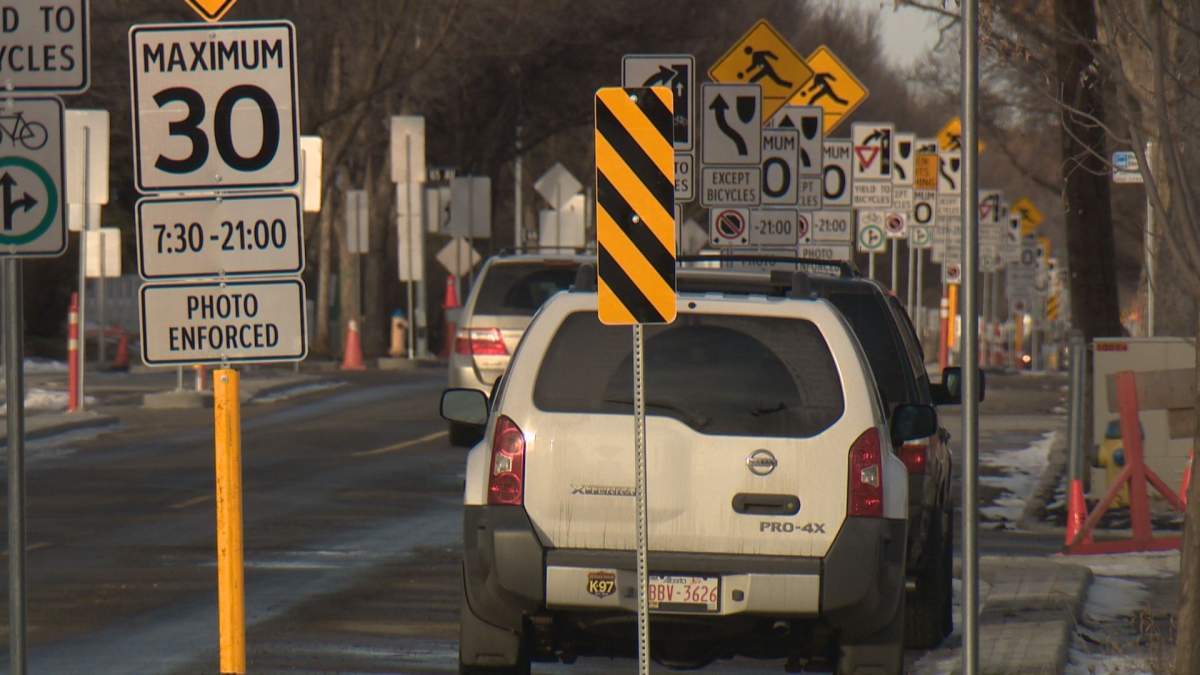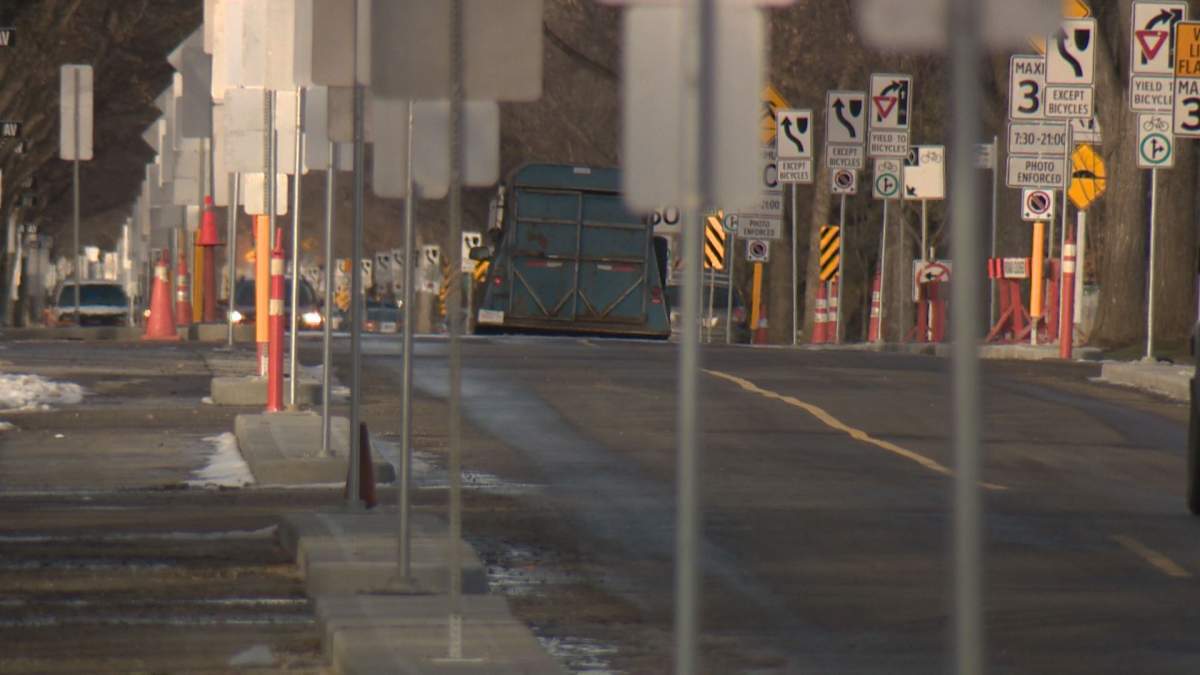Anyone peering down 106 Street from 61 Avenue will notice a lot of one thing: street signs.

Within a 15-block distance, there are about 220 different signs — from playground zone notifications and speed limits to bike lane advisories, traffic advisories and more.
READ MORE: No, they’re not ripping up a perfectly good new bike lane and road
“Way too much,” said Frencise Miller, who was visiting Edmonton. “There’s an easier way to get the directions without that many street signs. It seems like there’s four on each block, maybe even five.
“It’s hard to find what the street sign is,” she added. “To me, anyway, it’s too much.”
Ray Cislo cycles down the street often.
“There are many, many signs but you become pretty much oblivious to them after a little while,” he said.
READ MORE: Homeowners call Edmonton bike lanes on 76 Ave flawed and non-functional
He says this route isn’t the only bike lane in Edmonton also peppered with signage.
“Aesthetically, it’s overwhelming to see the signs for the first time.
“But if it serves a purpose to remind the cyclists and the drivers, I’m willing to put up with that in order to have the peace of mind of going on a safe bike lane,” Cislo said.
READ MORE: Growing petition calls for removal of downtown bike lanes
He said the 102 Avenue bike lane also has a lot of signs. He hopes that as drivers and cyclist get used to the new infrastructure, fewer signs will be needed.
“I’m aware they’re there to provide the drivers with information about what they should or shouldn’t be doing. It also provides information for the cyclist.”
Watch below: In a 15-block span, there are about 220 traffic signs along 106 Street in south Edmonton. Why so many signs? Kent Morrison spoke to residents, cyclists and the city, hoping to find out.

Victor Andrucson has lived in the south Edmonton neighbourhood for five years. He’s witnessed first-hand the changes to the street.
“It looks nice,” he said of the upgrades. “I suppose when you have all your lovely tree-lined streets and then you have more poles than you have trees, it’s a little excessive.”

Get daily National news
“It’s a lot. There’s a lot of signs,” Andrucson said. “I would probably glance over everything but the speed sign and the stop sign, to be honest.”
Councillor Michael Walters is hearing feedback from residents about the amount of signs.
“It’s striking for sure and people recognize that and I think it’s fair for us to ask questions.”
“I wonder if the folks who worked so hard on the concept of that road renewal — including more safety for pedestrians, the bike lanes, the speed limits — also imagined this outcome that included this number of signs?” he said.
READ MORE: 68 Edmonton locations ID’d as 30 km/h playground that should be 50 km/h
Walters believes the sheer number of signs could be the combination of playground zone speed limits, bike lanes and construction rules being implemented at the same time.
“I hear from constituents that it is confusing.
“I know when I go back and forth on 76 Avenue, I’ve wondered to myself: ‘Why are there so many signs here? Why does our administration think this many signs are required? What are the technical reasons for that number of signs?'”
Whether it’s at a committee meeting or not, he thinks a discussion should take place around what the technical requirements are for this number of signs.
“Seemingly every five to 10 feet there’s a sign. Unfortunately it can be fodder for some mockery and we have to ask ourselves — particularly our administration should ask ourselves: why are all those signs required?”
In a statement emailed to Global News, a spokesperson for the city’s road services said each sign serves a purpose.
“When determining whether a sign is needed, the city uses guidelines indicated in the manual of Uniform Traffic Control Devices, provided by the Transportation Association of Canada,” Derek Logan said. “At the same time, a certain level of professional judgement is used, especially when considering not only all the activity on the road but the activity going around it, such as playgrounds, schools and other public spaces.
“In the case of 106 Street, there are bike lanes, pedestrian crossings, reduced speed playgrounds and school zones along the street,” he said.
“While it may seem like a lot of information, each sign has a purpose, providing specific information the road user — driver, pedestrian, cyclist — to travel the road safely. This not only benefits residents, but also… visitors who are not familiar with the neighbourhood.
“In roadway design, we want to make sure everyone gets the same message so everyone can travel to their destination safely.”
Logan said the department has fielded similar inquiries from the residents of the Queen Alexandra neighbourhood.
- Carney unveils ‘Buy Canadian’ defence plan, says security can’t be a ‘hostage’
- Rhode Island shooter killed ex-wife, son before bystanders intervened: police
- Canadian immigration officers investigating hundreds identified by extortion task force
- ‘Canada can broker a bridge,’ Carney says on new trading bloc efforts
















_848x480_1397405763961.jpg?h=article-hero-560-keepratio&w=article-hero-small-keepratio&crop=1&quality=70&strip=all)

Comments
Want to discuss? Please read our Commenting Policy first.